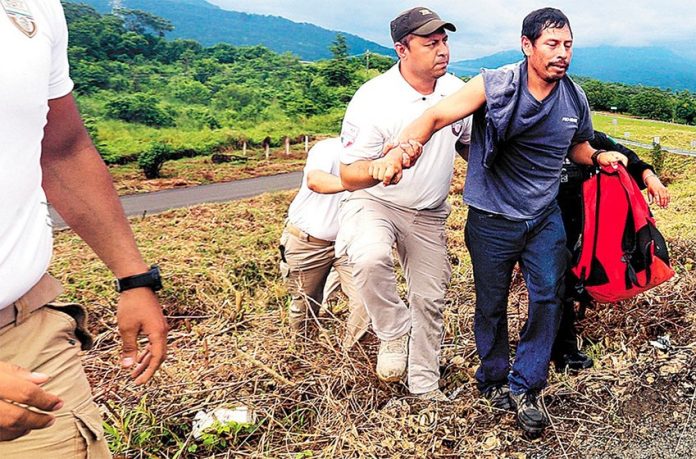Immigration officials and Federal Police detained and deported 160 members of the second migrant caravan yesterday because they entered Mexico illegally.
The Central American migrants were arrested while walking or hitching rides from Tapachula to Huixtla in the southern state of Chiapas.
Nine kilometers before the caravan reached the latter town, immigration officials and police blocked the migrants’ path with about 30 vehicles.
Some succeeded in outrunning the authorities while those detained were taken to a National Immigration Institute (INM) facility where they were put on buses and taken to the Tapachula airport.
There, they were placed aboard a Federal Police plane and flown to San Pedro Sula, Honduras.
The INM told the newspaper Milenio that more migrants traveling as part of the first and second caravans who entered Mexico without going through official immigration channels will be detained in the coming days.
The federal government warned two weeks ago that Central American migrants traveling to the United States via Mexico would be detained and deported if they entered the country illegally, but prior to yesterday’s detention authorities have made few attempts to stop migrants from traveling through the country.
Many members of both the first and second caravans entered Mexico by crossing the Suchiate river, which separates Guatemala from Chiapas, by wading, swimming or riding on rafts.
Members of the second caravan clashed with Federal Police at the border last Sunday.
The migrants threw rocks and used sticks against the police after toppling a metal barricade blocking their entry into Mexico on the border bridge.
A 26-year-old Honduran man died during the confrontation, allegedly after being shot in the head with a rubber bullet. But Mexican authorities denied that police fired at the victim.
United States President Trump seized on the clash at a rally in Florida yesterday, telling supporters that the migrants are “not angels.”
“You saw what happened two days ago with the Mexican military and the Mexican police. You saw what happened there, how tough the opposition is,” he said.
“We’re tougher than anybody. We’re tougher than any force. And we’re probably going to have to be unfortunately.”
Trump also floated the idea yesterday that as many as 15,000 troops could be sent to the United States’ southern border just days after the U.S. Department of Defense said that it would send around 5,200 active-duty troops there.
Meanwhile, migrants in the first caravan are continuing their journey through Oaxaca after failing to secure transportation to Mexico City for its approximately 4,000 members.
Migrant advocacy group Pueblos Sin Fronteras (People Without Borders), which is supporting and helping to organize the caravan, accused the federal government of blocking the migrants’ travel to the capital by bus.
“The plan to cross Oaxaca in transportation was blocked by the federal government. Today, there was a possibility of more than 70 buses from different sources of support but under pressure from the federal government of Mexico, they withdrew their support,” the organization said in a statement.
That left the migrants with “the sole option of continuing on foot towards Veracruz, a state with an extremely high risk of violence at the hands of organized crime,” it continued.
“The Mexican federal government will be fully responsible for any aggression against the members of the exodus and accompanying persons.”
At a meeting last night, the migrants decided to change their route and head today towards the city of Matías Romero, about 60 kilometers northeast of Juchitán, where they spent the last two nights.
The highway to Oaxaca city is winding and mountainous and has few towns with the infrastructure to receive such a large group of migrants, Pueblos Sin Fronteras said.
“The delicate health condition of [caravan members], especially of children, implies risks due to the lack of access to medical services in the route towards Oaxaca city,” it explained.
